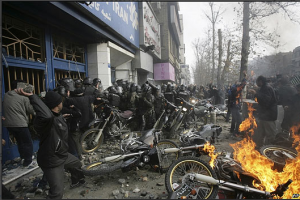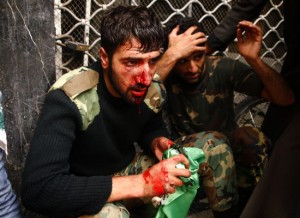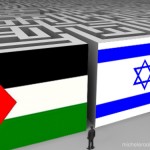The Latest from Iran (28 December): The Regime's Arresting Strategy
 Monday, December 28, 2009 at 20:55
Monday, December 28, 2009 at 20:55  2115 GMT: Battling with Statements. The Assembly of Combatant Clergymen has condemned those it says are responsible for violence on Ashura, namely the security forces and plainclothes militia: "The Almighty God will cut off the hands of these deceived fools." The Assembly added:
2115 GMT: Battling with Statements. The Assembly of Combatant Clergymen has condemned those it says are responsible for violence on Ashura, namely the security forces and plainclothes militia: "The Almighty God will cut off the hands of these deceived fools." The Assembly added:Today we should cry blood that on the day of Hossein’s Aashura and after all sorts of insults to Imam Khomeini’s family and his legacy by the phony defenders of the revolution, there was an attack on the prayer hall [in Jamaran, where former President Khatami was speaking] that is a reminder of the name and memory of the Imam. The peaceful ritual of commemorating Aashura was attacked by clubs, batons and chains and by insulting slogans. Those who [did this] made the utmost insults to both Ashura and Imam Khomeini and then beat and bashed innocent people.
Daftar-Tahkim-Vahdat, the main reformist Student Alumni Organisation, also issued a statement:
What a regret that a government that considers itself to be risen from religious teachings and a national revolution, on the noon of Ashura opens fire on innocents and does what even the most notorious rulers of this country throughout the history [e.g. the Shah deposed in 1979] had not dared to do.
2055 GMT: Taking Sides? We've posted the video of President Obama's statement (see 2020 GMT) and it's even harder-hitting than we thought:"History will be on the side of those who seek justice"
2035 GMT: How Many Detained Yesterday? Rah-e-Sabz reports that 400 to 500 protesters were arrested Sunday in Isfahan, including the brother and two nephews of former Minister of Interior Abdollah Nouri. Human Rights Activists News Agency are now saying 1100 people have been transferred to Evin Prison in Tehran.
2025 GMT: Dastghaib Calls for A Movement. Ayatollah Dastgheib has issued a statement for fellow marja (high-ranking clerics) to join him in calling on the Government to adhere to the Constitution.
NEW Latest Iran Video: Obama Condemns “Violent & Unjust Suppression” (28 December)
NEW Iran: Ashura’s Message “Iranians Are Not Punching Bags” (Josh Shahryar)
NEW Iran: A Point of No Return?
Iran: A 5-Minute, 5-Point Reaction to The Events of Ashura
Iran: The False US Friends of the “Iranian People” (An Open Letter to Charles Krauthammer)
Latest Iran Video: The Ashura Protests (27 December — 3rd Set)
Latest Iran Video: The Ashura Protests (27 December — 2nd Set)
Latest Iran Video: The Ashura Protests (27 December)
The Latest from Iran (27 December): The Day of Ashura
2020 GMT: Obama Speaks. The US Government has definitely decided to throw rhetorical support behind the Iranian opposition. The President, in a press conference which will focus on the foiled attempt to blow up a Detroit-bound jet, has taken the time to comment on events in Iran.
Obama hailed the "courage and conviction" of Iran's people and said the Government must respect their rights:
We call for the immediate release of all who have been unjustly detained....The United States joins with the international community in strongly condemning the violent and unjust suppression of innocent Iranian citizens. What is talking place within Iran is not about the United States or any other country. It is about the Iranian people and their aspirations for justice.
1900 GMT: They Burned 18 Garbage Bins?! Sometimes you have to admire the Iranian regime. It is walking a fine line between showing that Sunday's protests were serious enough that the demonstrators must be punished but not so serious enough that they pose a threat to the regime. This is tonight's magical public-relations solution:
Head of the Public Relations office of Tehran's Safety Services and Firefighting Organization Behrouz Tashakkor said 838 firefighters were dispatched to various locations in Tehran on Ashura. "Nine residential buildings, 9 vehicles, 7 shops, 2 banks and 3 power stations were set on fire [by anti-government protestors]," Tashakkor said.
The Iranian official added that "18 garbage bins" were also set on fire.
1855 GMT: Karroubi Targeted? Saham News reports that Mehdi Karoubi, attending an Ashura mourning ceremony with his family, was attacked by plainclothes militia as he left the mosque. Karoubi’s car was attacked and vandalised, breaking the front windscreen, before onlookers intervened.
1840 GMT: More on Emad Baghi's Arrest (see 1140 GMT). An EA contact has given us the following information:
This morning plainclothes officers entered Baghi's home, with others standing at the door. They insulted his wife and daughters and turned him home into a garrison and badly beat his brother-in-law. As Baghi was taken away, he read a verse of the Qu'ran calling for tolerance and patience in difficulties. One of his captors said, "His life is short enough that he can see the future."
One of the accusations against Baghi is his interview with the late Grand Ayatollah Montazeri in a movie recently broadcast by BBC Persian.
Baghi's whereabouts tonight are unknown.
1740 GMT: The BBC has published a comprehensive list of Western countries which have strongly criticised the Iranian Government's bloody crackdown and called for Tehran's restraint.
1555 GMT: Where is Mousavi's Body? According to the Islamic Republic News Agency, the body of Mir Hossein Mousavi's nephew Seyed Ali is being held by Government authorities while investigations are carried out on a death "under suspicious circumstances".
1530 GMT: Javan Farda reports that the son of Ayatollah Jaleleddin Taheri has been arrested in Isfahan. Taheri has been under pressure in recent days after his attempt to lead a memorial service for Grand Ayatollah Montazeri.
1444 GMT: Rah-e-Sabz is reporting that metro stations in central Tehran have been closed. The likelihood is that this is because of Government fears of escalation of protests at 7 Tir Square.
1440 GMT: Arresting the Martyr's Mother. One of "the others" arrested at the house of activist Mahin Fahimi (see 1335 GMT) was the mother of Sohrab
Arabi, who came to prominence when it emerged in July that he died from Basiji gunfire on 15 June.
1435 GMT: First Clashes of Today? We are getting reports of a crowd gathering in Tehran's 7 Tir Square and clashes with security forces.
1405 GMT: Keeping Rafsanjani in a Box. Former President Hashemi Rafsanjani did not make an appearance yesterday, but that does not mean that the regime pressure on relented --- indeed, since that pressure might have muted Rafsanjani on Ashura, why not maintain it?
Fars News keeps up the campaign this morning, claiming that Rafsanjani's daughter Faezeh Hashemi joined "rioters" on Ashura after spending her holidays in the north of Iran (in other words, she partied during the first days of Moharram and joined the protests just for fun).
1400 GMT: The Arrests. Another vital list, this one from Neo-Resistance, which posts these details of arrests:
Ebrahim Yazdi (former Foreign Minister)
Emad-e'Din Baghi (Human Rights Activist)
Morteza Hadji (Minister of educaion during Khatami era)
Leila Tavassoli, daughter of Mohammad Tavassoli
Seyed Hosein Mousavi Tabrizi (Head of the clerical Association of Teachers and Researchers of Qom)
Alireza Beheshti Shirazi (Editor in Chief of Mousavi's online journal Kalameh Sabz)
Ghorban Behzadian Nejad (Mousavi consultant)
Mohamad Bagherian (Mousavi consultant)
Rasouli (deputy of President Khatami's Baran Foundation)
Forouzandeh (Manager of Mousavi's office)
Mohammad Sadegh Rabbani (retired university professor who used to be the general prosecutor 20 years ago, arrested yesterday 27 December)
Mohammad Moin (son of former Presidential candidate Mostafa Moin, the former Minister of Science and higher education, arrested 27 December)
Heshmatollah Tabarzadi (Student Activist)
Haleh Sahabi (Women's Rights activist)
1355 GMT: Reports that journalist Mostafa Izadi arrested.
1350 GMT: We Break for This Official Announcement. Press TV: "Brigadier-General Masoud Jazayeri, the deputy commander of Iran's armed forces, on Monday defined the 'actions of a group of hooligans on such days of mourning' as another 'low act' incomparable to anything seen before. He described the 'small group of vandals' as marginal compared to 'millions of real Ashura mourners'."
Now back to regular programming....
1342 GMT: Essential Information. HomyLafayette has posted a summary with information on those swept up in the Government's wave of arrests. Josh Shahryar has compiled information, complete with map, on the locations across Iran of protests yesterday. And an EA reader points us to an excellent collection of photographs from the Ashura protests.
1335 GMT: Claims coming in that Government forces entered the home of peace activist Mahin Fahimi, arresting her, her son, and others.
1303 GMT: Mousavi's Body. We continue follow conflicting reports over the fate of the body of Mir Hossein Mousavi's nephew Seyed Ali with reports that it was taken from the Ebn -e-Sina Hospital by Government authorities.
1258 GMT: Deaths and Arrests. One of those killed yesterday was the son of Shahin Mahinfar, the prominent IRIB journalist.
An Iranian source reports that Abolfazl Ghadyani of the Mojahedin has been arrested.
1236 GMT: There are unconfirmed reports that the head of the Iranian Embassy in Norway has resigned citing his support of the green movement.
1205 GMT: The Human Rights Activists News Agency claims that 550 people arrested on Sunday have been transferred to Evin Prison.
1200 GMT: Answering Our Question. Masoud at The Newest Deal has a lengthy analysis which responds to our interim assessment this morning, "Point of No Return?". His reply? "One thing that is certain is that there is no turning back."
1140 GMT: The Regime Strikes Back (Cont.). The strategy of the Government is to "break" the movement --- much as it appeared to do in June, in July, in August, in September --- with arrests and disruption of communications.
EA sources confirm that Emad Baghi, the founder of the Association for Defense of Prisoners Rights, has been arrested. (Parleman News has now reported this.) A reliable source writes that Heshmatollah Tabarzadi, leader of the banned Democratic Front of Iranian People, has been taken from his home.
The site Rah-e-Sabz is under sustained cyber-attack and, of course, Kalemeh has been hindered by the arrest of its editor (see 1040 GMT). It is also reported that Etemaad newspaper has been closed.
1040 GMT: The Regime Strikes Back. A pattern is emerging of the Iranian Government trying to regain the initiative through arrests last night and this morning. Alireza Beheshti Shirazi, the editor of Mir Hossein Mousavi's Kalemeh, has been detained.
1010 GMT: The Mousavi "Assassination" Story (The Official Iran Version). Fars News tries to put both the Ashura demonstrations and the death of Mir Hossein Mousavi's nephew into "proper" perspective. As with the death of Neda Agha Soltan in June, the killing of Seyed Ali Mousavi was carried out by specially-trained teams, linked to the 10 "terrorists" slain by Iranian forces. The story will then be taken up by foreign media as proof of the evil of Iran's regime.
0955 GMT: The Mousavi "Assassination" Story. The New York Times has a lengthy and very useful article, written by Robert Worth and Nazila Fathi. In the review of Sunday's events, one passage is striking, especially if the line is taken up by other US media (who have in past have been fond of filmmaker Mohsen Makhmalbaf as a "spokesman" for the Green movement):
Unlike the other protesters reported killed on Sunday, Ali Moussavi [the nephew of Mir Hossein Mousavi] appears to have been assassinated in a political gesture aimed at his uncle, according to Mohsen Makhmalbaf, an opposition figure based in Paris with close ties to the Moussavi family.
Mr. Moussavi was first run over by a sport utility vehicle outside his home, Mr. Makhmalbaf wrote on his Web site. Five men then emerged from the car, and one of them shot Mr. Moussavi.
0950 GMT: Correct us if we're wrong, but it appears that the reformist site Rah-e-Sabz, an important source for news, has not updated since 0120 GMT (4:50 a.m. in Tehran).
0935 GMT: Non-Violence and Self-Defense. We've posted a provocative analysis by Josh Shahryar of the events of Ashura, "Iranians Are Not Punching Bags".
0930 GMT: Rah-e-Sabz has more on what appears to be a Government raid on the offices of the Assembly of Teachers and Researchers of Qom. Earlier it was reported that Hossein Mousavi Tabrizi, the head of the Assembly, was arrested.
0845 GMT: The Regime (Tries to) Strike Back. Unconfirmed reports that, in addition to the arrest of prominent reformist Ebrahim Yazdi, Iranian authorities have detained Mir Hossein Mousavi's advisors Mohammad Baghriyan and Ghorban Behzadian-Nejad.
0755 GMT: We're still getting amazing video from yesterday. The latest clip --- of heavily-armed security forces pinned back against a wall by protesters --- will go up in two minutes.
0745 GMT: A day to catch up with news, to stand back and assess.
My own impression --- and this is personal, not an "official" EA line --- is that the protests of Ashura were an important marker that the Iranian Government will not stand, at least with its current President and its current political approach. How much farther this goes --- is this now an indication that only sweeping changes in the Iranian system, extending to the authority of the Supreme Leader, will avert even more dramatic showdowns? --- is what I cannot quite grasp.
We've posted two "thinkpieces" setting out the possibilities: late last night, I wrote a "5-Minute, 5-Point Reaction" and this morning we've set out some thoughts in "A Point of No Return?"
 Abdollah Nouri,
Abdollah Nouri,  Alireza Beheshti Shirazi,
Alireza Beheshti Shirazi,  Ashura,
Ashura,  Assembly of Teachers and Researchers of Qom,
Assembly of Teachers and Researchers of Qom,  Association for Defense of Prisoners Right,
Association for Defense of Prisoners Right,  Association of Combatant Clergy,
Association of Combatant Clergy,  Ayatollah Ali Mohammad Dastghaib,
Ayatollah Ali Mohammad Dastghaib,  Ayatollah Hossein-Ali Montazeri,
Ayatollah Hossein-Ali Montazeri,  Ayatollah Jaleleddin Taheri,
Ayatollah Jaleleddin Taheri,  Barack Obama,
Barack Obama,  Behrouz Tashakkor,
Behrouz Tashakkor,  Daftar-Tahkim-Vahdat,
Daftar-Tahkim-Vahdat,  Democratic Front of Iranian People,
Democratic Front of Iranian People,  Ebrahim Mousavi,
Ebrahim Mousavi,  Emad Baghi,
Emad Baghi,  Etemaad,
Etemaad,  Faezeh Hashemi,
Faezeh Hashemi,  Fars News,
Fars News,  Ghorban Behzadian-Nejad,
Ghorban Behzadian-Nejad,  Hashemi Rafsanjani,
Hashemi Rafsanjani,  Heshmatollah Tabarzadi,
Heshmatollah Tabarzadi,  HomyLafayette,
HomyLafayette,  Human Rights Activists News Agency,
Human Rights Activists News Agency,  Iran,
Iran,  Iran Elections 2009,
Iran Elections 2009,  Islamic Republic News Agency,
Islamic Republic News Agency,  Javan Farda,
Javan Farda,  Mahin Fahimi,
Mahin Fahimi,  Mehdi Karroubi,
Mehdi Karroubi,  Mir Hossein Mousavi,
Mir Hossein Mousavi,  Mohammad Baghriyan,
Mohammad Baghriyan,  Mohsen Makhmalbaf,
Mohsen Makhmalbaf,  Mojahedin of Islamic Revolution,
Mojahedin of Islamic Revolution,  Mostafa Izadi,
Mostafa Izadi,  Nazila Fathi,
Nazila Fathi,  Neda Agha Soltan,
Neda Agha Soltan,  Neo-Resistance,
Neo-Resistance,  Parleman News,
Parleman News,  Robert Worth,
Robert Worth,  Saham News,
Saham News,  Seyed Ali Mousavi,
Seyed Ali Mousavi,  The Newest Deal in
The Newest Deal in  Middle East & Iran
Middle East & Iran 
 Last week, Palestinian Authority leader Mahmoud Abbas spoke with the Wall Street Journal's Charles Levinson about a wide range of issues including : the future of peace talks with Israel and the Obama Administration's role; Israeli settlements; boycotts; the possibility of a third Intifada; alleged CIA links to Palestinian "torture"; and the Goldstone Report on Gaza.
Last week, Palestinian Authority leader Mahmoud Abbas spoke with the Wall Street Journal's Charles Levinson about a wide range of issues including : the future of peace talks with Israel and the Obama Administration's role; Israeli settlements; boycotts; the possibility of a third Intifada; alleged CIA links to Palestinian "torture"; and the Goldstone Report on Gaza. Josh Shahryar offers this assessment of Sunday's events,
Josh Shahryar offers this assessment of Sunday's events,  Israeli Defense Forces, commanded by the government of Ehud Olmert, started Operation Cast Lead on 27 December 2008. The operation took the lives of 1,400 Palestinians, including many civilians, and of 13 Israelis.
Israeli Defense Forces, commanded by the government of Ehud Olmert, started Operation Cast Lead on 27 December 2008. The operation took the lives of 1,400 Palestinians, including many civilians, and of 13 Israelis. The Muslim Council of Britain's Secretary-General Muhammad Abdul Bari
The Muslim Council of Britain's Secretary-General Muhammad Abdul Bari